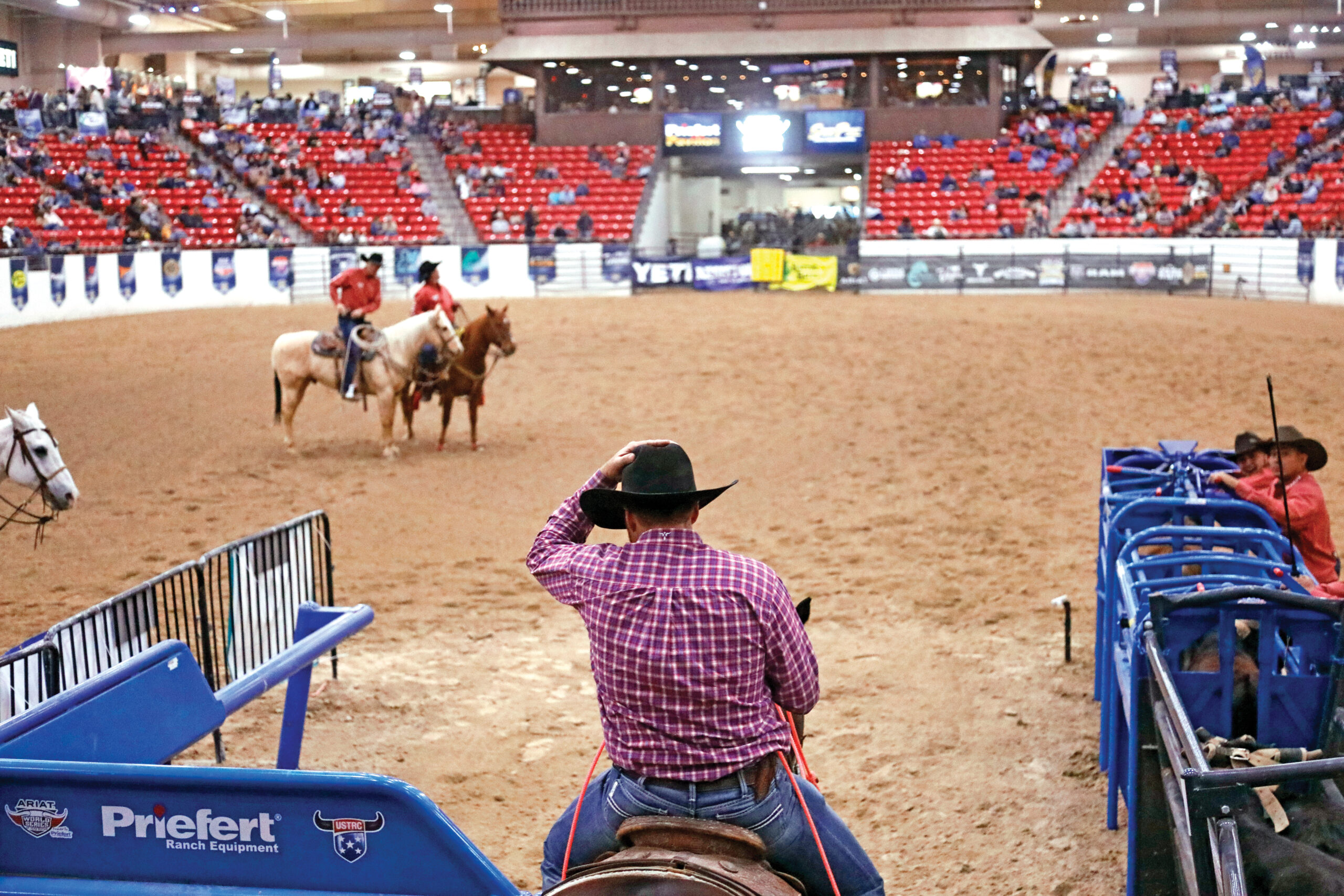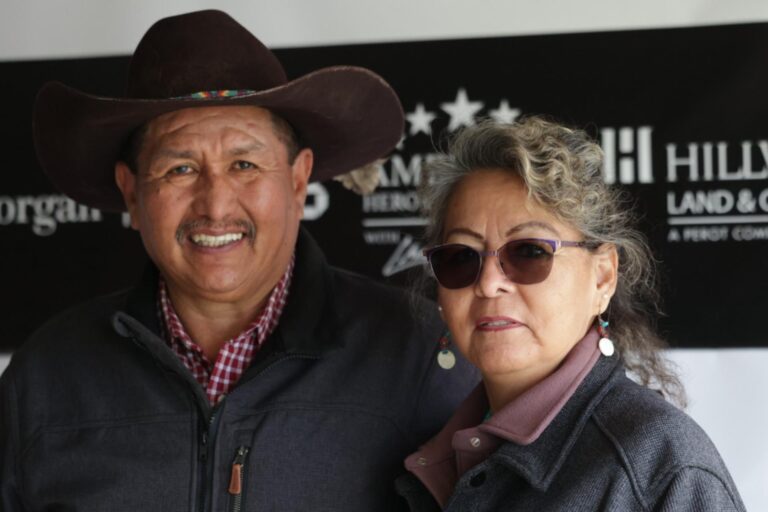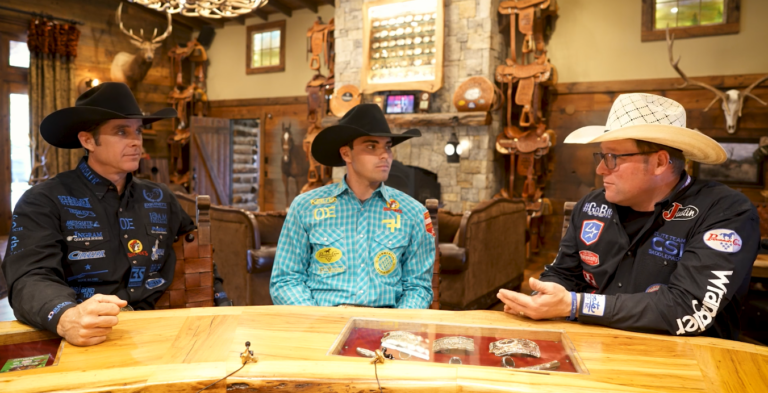For most of the teams entering the 2022 Ariat WSTR Finale in Las Vegas this December, this sport isn’t their main source of income.
They’re doctors, lawyers, construction workers, bankers or cattlemen and every career in between. For many, fitting in time to get ready to rope for a few hundred thousand dollars isn’t easy between meetings and kids’ soccer games and dance competitions.
Luckily, roping has evolved to meet the needs of the weekend competitors who take their hobbies as seriously as their careers. With professional coaches, roping machines and constant streams of instruction on any device, being sharp with minimal practice is more possible now than ever before. We tap some of the sport’s best for their pre-Finale, short-on-time advice.
Nick Sartain
2009 World Champion Header, 2018 WSTR Finale Champion
Finale Prep: The main thing for me is to use the Heel-O-Matic. I can’t put too much time into my heeling because I head for a living, so I make sure my swing is right on the dummy. I don’t have to have anybody help me or fit my practice in with anyone else. I can lope my horse around to have him in shape and make sure everything feels right and my angles are correct. If I’m limited on time, I will make 10 or 15 shots on the Heel-O-Matic for the day and call it good.
But regardless, I make sure to ride my horse. My horse needs to be in good condition and have the edge off him and be ready to go. I’m more concerned my horses aren’t short, aren’t quick, aren’t taking a throw away, and are in good soundness mentally and physically.
Tyler Wade
Five-time NFR Header
Finale Prep: Even if you only get to practice on weekends or one night a week, this plan can work for you. Ideally, you have two horses: one you want to ride in Las Vegas, and one you can practice on. You need to practice for yourself on your practice horse. Then, you make sure your good horse is ready and practice for him. We work so hard on our roping, the horsemanship goes out the window. But getting to rope for that much money in Las Vegas, you need to make sure that, if you need to take an extra swing, he’ll let you.
That means you need to practice for what your horse needs. Sometimes it’s a lot of riding and a couple runs. Sometimes it’s a couple trotters a day.
A point of caution: I’ve known guys who get caught roping so much in Arizona that their good horse is a little on the muscle, or sore, or tired for the big money. Have enough horses to make it work or save the one you do have for the Finale. Don’t run too many in Arizona.
When you can’t get a regular practice in, make 10 minutes to rope the dummy with a strong foundation and good muscle memory. Don’t worry about cutting the horns off. If you’re too sharp, you’re not giving yourself enough room for error if that steer steps right or left. A good strong foundation and muscle memory are what you need and, for $200,000 a man, it’s the best way to be ready.
Kory Koontz
22-time NFR Heeler
Finale Prep: The one thing that has to happen to go be successful: Your horse has to be ready.
Even though you own a business or you work for a living, you have to find time to exercise your horse or rope on your horse, or you need to pay someone who does. That’s the main thing at every level. Whatever that takes. You have to have your horse prepared. You have to make time for that. Then, just make sure you make time to rope the dummy. It’s kind of like exercise for your ability. It can be 10 minutes or an hour. Get your rope in your hand so you feel ready and you’re comfortable.
When you do get horseback, do not just rope to be roping. I know it probably feels so much better than being in an office or on a job site, but try to make it out like you’re roping at a World Series. Go make four clean runs in a row. Make it to where it counts. It’s quality, not quantity. I would say if you have limited time, think it out. Plan it out.
If you’re sitting at work, you probably have a pen and paper or sticky note nearby. When I was rodeoing, I didn’t write my goals down enough. But now, I’ve learned how good that is to do. You can make all kinds of mental notes, but when your mind gets too busy, the important stuff can wash away. So if you write it down and look at it every day, that will help keep it fresh on your mind. It becomes more real and more applicable, and you’ll be able to draw from it when your money is up.

Charly Crawford
10-time NFR Header
Finale Prep: You come home from work, and you have one hour to practice after you get your steers gathered and loaded and your horse saddled. Before you get on that one horse, you want to be ready to use the time wisely.
Rope the dummy first and get the feel slowly. Get your mind off of work. Focus on the fundamentals. Swing slow and get that feel back. Speed it up from there. Don’t be scared to rope outside of your comfort zone. Roping in the same spot is great, but it’s unrealistic. Rope too close, rope too far away, rope too narrow.
Here’s my 10-minute dummy drill that can really set you up for success when you get on your horse. For the first three minutes, swing slow and throw four to five loops per minute. Get 12 to 15 loops in there in the first three minutes. For the next two minutes, get eight to 10 loops too far to the right. Then for two more minutes, throw eight to 10 loops from too wide of a position. And the next two minutes, go back and forth between too close and a coil back—that will prep you for drawing the loper and getting to him too quick or drawing a strong one and having to run him to the back end and pull off a shot. Within nine minutes you’ve almost covered what every steer could give you. You have had to adjust to make shots happen. In your last minute, you have four loops. Visualize yourself at the Finale. Imagine the white walls, the Ariat banners, the music and the crowd. Focus for that one minute like you’re ready for the Finale and execute those four runs.
Within 10 minutes, you’ve worked on every shot. You can run four to six steers on that one horse, and you’re mentally ready. It’s easier to fall into a groove. Too many people try to take all those reps on the horse. You can only get so many runs on your horse and on your steers before they wear out. So you’re just trying to get to where you’re ready and prepared before you even get on.
Patrick Smith
Two-time World Champion Heeler
Finale Prep: This might sound corny to some, but if I only got to rope once or twice a week, I’d want to write down my goals for my roping so I could go back to them the next week and know what to focus on.
When you do get to practice, video. Then on other days, if you don’t get to rope, at least you can watch your runs for 10-15 minutes and visualize.
Remember: Your horsemanship matters as much as your roping. Set yourself up for success by preparing the animals as much as yourself.
Time management is key. The less practice you get, the more impactful your practice needs to be. If you just want to hang out with your buddies, do that. But if you really want to get ready for the Finale in Las Vegas and be better, you need to capitalize on your practice. Video, study the video during the week. Execute and cross goals off the list. You’ll be amazed at the difference you see.
Key Takeaways
- Make sure your horse is in shape—even if you have to hire someone to lope him for you.
- Use your roping machine to maximize practice efficiency.
- Hone-in on the fundamentals on the ground dummy.











